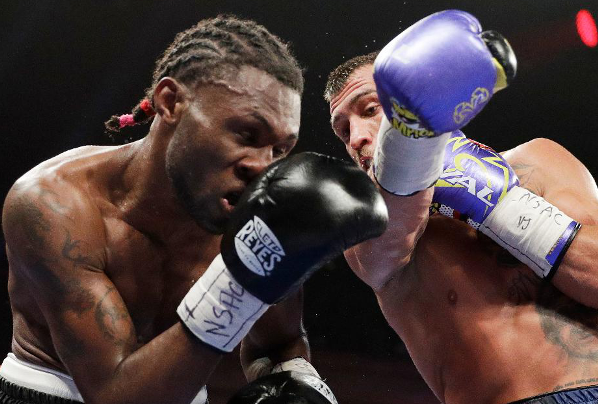By Ryan Donald
If the first seven rounds of their WBO super-featherweight title fight were any indication, Jamaican boxer Nicholas Walters could have fought Vasyl Lomachenko another 20 rounds and still not figured out how to defeat him.
Then again, we’ll never know. Walters declined to continue (OK, quit) after the seventh round of a one-sided affair that Lomachenko – a two-time Olympic champion – dominated. Lomachenko (7-1) is an up-and-coming talent determined to be the top “pound-for-pound fighter” in the world.
But Walters quit, which in the warrior’s creed world of boxing is a huge no-no. Ken Norton busted Muhammad Ali’s jaw in the early rounds back in the day, but Ali carried on to the bitter end. There are hundreds of other examples of boxers forging ahead despite gruesome injuries.

Moreover, Walters wasn’t injured when he called it a day against Lomachenko. Yes, Lomachenko was coming off of an exceptional Round 7 in which he landed several power shots, but Walters certainly seemed able-bodied enough to continue.
Why quit?
Walters hadn’t fought in nearly a year before he stepped into the ring against Lomachenko and it showed. He struggled to land punches as Lomachenko’s wizard-like defense appeared impenetrable. Meanwhile, Lomachenko’s combinations scored often against Walters, who entered the bout with a 26-0-1 record.
Lomachenko picked up the pace in the third round and landed a hard left that stunned Walters. From then on, Lomachenko established himself as the aggressor, though Walters landed a couple of hard shots in the fifth round.
The seventh round was all Lomachenko, as he landed several combinations that brought his fans who were in attendance in Las Vegas to their feet. Walters weathered the onslaught – or so it seemed – but called it a night while sitting in his corner after the round.
Afterward, Walters cited his inactivity as the primary reason he decided that another five rounds of Lomachenko would be a futile, if not dangerous, exercise.
“(The inactivity) took a toll on my body,” said Walters, who described his performance as an “off night.”
Perhaps Walters may even be forgiven: Lomachenko would have been a difficult test on a “good” night, and absorbing five more rounds of punishment would only reinforce the notion that boxing is a very dangerous game. The problem is, will promoters and boxing fans forgive Walters? It’s tough enough getting back on the horse after a one-sided loss; perhaps even more difficult after a lopsided defeat in which the boxer decides to quit and go home.
For Lomachenko, whose brief pro career has dazzled, the sky is the limit. For Walters, however, earning back the respect he’d built over an unbeaten career must start at a much lower altitude.